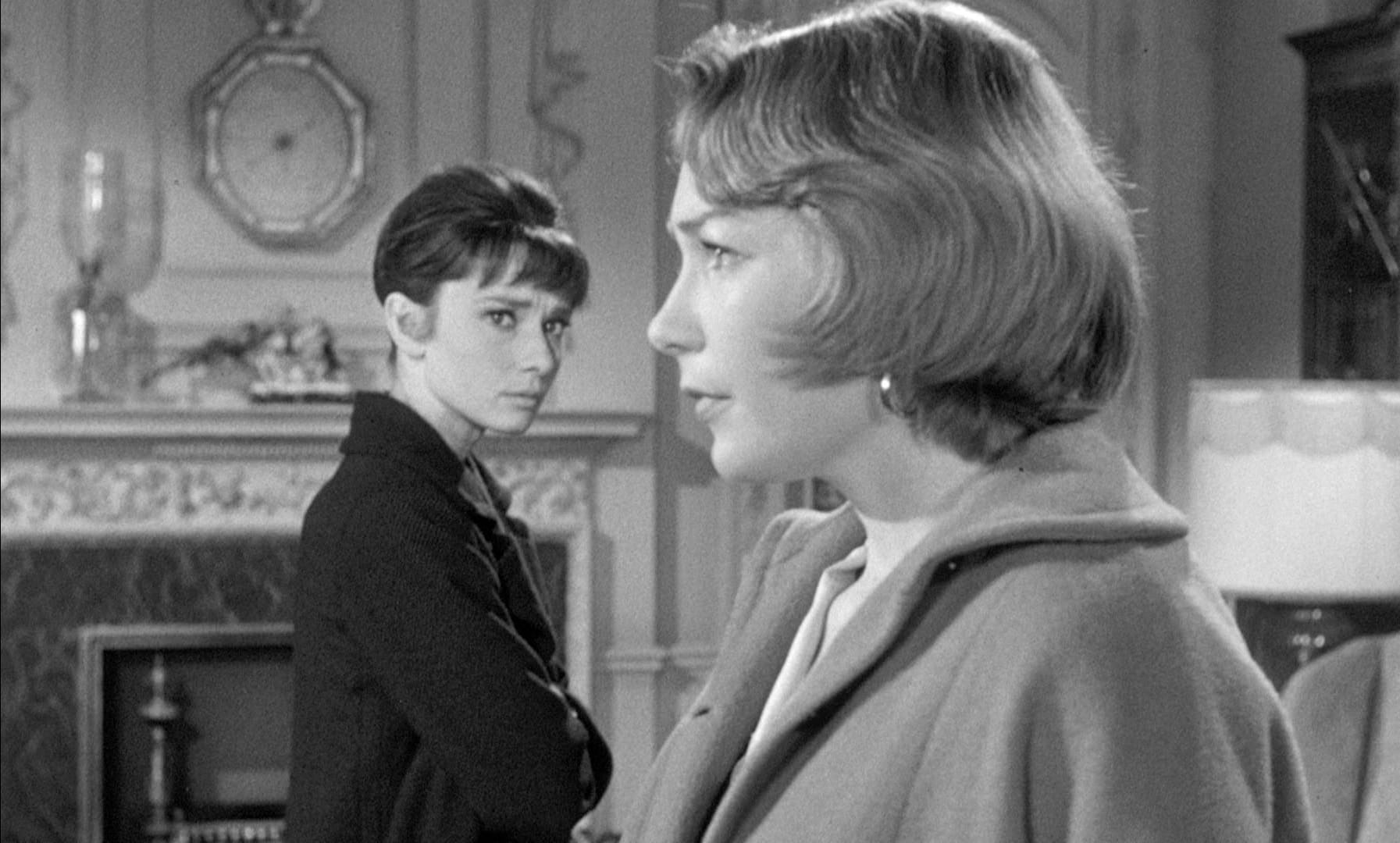By the beginning of the 1960s, when The Children’s Hour was produced, a handful of rebellious filmmakers, including Otto Preminger (The Moon Is Blue), Elia Kazan (Baby Doll), and Joseph L. Mankiewicz (Suddenly, Last Summer), had spent several years pushing against the longstanding and much-derided code, increasingly testing the boundaries of what was sexually permissible on-screen. In this changing atmosphere, Wyler, who had directed These Three near the start of what in the intervening years became a storied career, decided to remake the film, restoring the original title and hoping to create an unflinching adaptation that would stay true to the source material. Wyler was in an enviable position: he was fresh off the Biblical (and, on account of being partly ghost-scripted by Gore Vidal, more than a little homoerotic) blockbuster Ben-Hur, which had won eleven Oscars and had been the highest grossing film of 1959. Though a small, character-driven drama that takes place largely in one interior location, The Children’s Hour would be a major, star-driven vehicle for United Artists, headlined by none other than Audrey Hepburn and Shirley MacLaine, direct from Breakfast at Tiffany’s and The Apartment, respectively. And this time, Hellman’s tragic final twist—that Martha does indeed have strong desires for Karen, which lead to her committing suicide—would remain intact.
When he was selected for this hot property in 1936, Swiss-German émigré Wyler was already a Hollywood veteran at thirty-four years old. He’d worked at Universal for more than a decade, directing dozens of films, including shorts and features, silents and talkies. Nevertheless, he hadn’t yet had his big breakthrough. He came to this project after being recommended by Hellman, who was a screenwriter in the Samuel Goldwyn stable. The Jewish leftist playwright had been a peripheral Hollywood figure for several years (before landing at Samuel Goldwyn, she was a script reader for MGM) and had admired Wyler’s work. Hellman had also previously collaborated with Merle Oberon when she cowrote Goldwyn’s adaptation of the play The Dark Angel (1935), a hit vehicle for the actor that had to be extensively rewritten after the Breen office took offense at the script’s plentiful sexual innuendos. This experience prepared Hellman for the job of severely reconceiving her own hit play for Hollywood standards of morality, so rather than engage in an unwinnable battle, she knuckled down and rewrote it as These Three.
In a New York Times article from 1936 published upon the release of the film, Frank Nugent acknowledged the Hays office’s effect on the play, calling it “considerably amended, but basically recognizable.” Never mind that without the implication of lesbianism, the point is made nearly illegible. Also never mind that the dramatic climax of The Children’s Hour—which, as incarnated in the 1961 film, would prove to be a central moment in the negative representation of homosexuality on-screen—fit right in with the moralizing extremes of the Motion Picture Production Code, essentially punishing its lesbian character by killing her off. Not only is the suggestion of Martha’s queerness an impossibility, the idea that two women could even be accused of lesbianism was beyond the pale in 1930s Hollywood. Denying the existence of same-sex attraction, These Three becomes a drama about extreme American puritanism and fear of childhood corruption, in this case the damaging influence an alleged heterosexual affair could have on the precious innocents at a boarding school.
There’s one child who’s anything but an innocent, though, and in These Three, she becomes a kind of replacement queer figure. As hellishly inhabited by thirteen-year-old Bonita Granville (who would be nominated for an Oscar in the year the Academy added the supporting acting categories), the lying, manipulative Mary is more than a wiseacre, she’s a full-on demonic force, frightening to the point of perversity, an aberration whose dark hair, permanent scowl, and boyish clothing stand in provocative contrast with the sugary sweetness of the rest of the girls in her class. She pinches, prods, twists their skin, rips their clothing, and intimidates them into agreeing with her nasty, vengeful lies about Martha and Karen. Because she isn’t inferring the women’s lesbianism and instead acting as a destructive force on Karen and Joe’s happy heterosexual couple and on Martha and Karen’s desexualized friendship, Mary becomes the type of irredeemable, delightfully nonnormative force one might see in a thirties horror movie.
The generalized queerness of the source material remains palpable in other moments and performances as well, especially in the usually glam, sexualized Hopkins’s knowing, occasionally winking take on ostensibly plain schoolmarm Martha. Though the role is transformed from closeted lesbian to lovesick best friend, Hopkins often subtly heightens the character’s sublimated eroticism, especially in her early scenes with Oberon, in which Martha and Karen, fresh college graduates, dream of running off and living together. When Karen crouches over Martha in bed, her arms nearly wrapped around her, and she asks her to “take a chance with me and come,” you can read not only ambition but romantic passion on Hopkins’s face. And though the film directs Martha’s unreciprocated desire at McCrea’s Joe (this film’s version of the “truth behind the lie”), Hopkins refuses to fall into “young old maid” clichés. Her sensuous presence is matched by Wyler’s vivid, tactile filmmaking, especially evident in an achingly beautiful nighttime scene in which cinematographer Gregg Toland’s camera elegantly tracks out from Martha, who is reclining on an easy chair beside a roaring fire as she watches Joe asleep on a nearby couch. Later, when she rages at the entire community’s willingness to believe Mary’s lies, Hopkins embodies an unforgiving, fiery fury, never succumbing to the kind of self-laceration that will ultimately define MacLaine’s intensely felt variation on the character.

